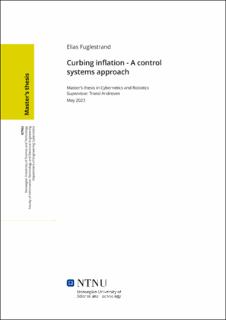| dc.contributor.advisor | Andresen, Trond | |
| dc.contributor.author | Fuglestrand, Elias | |
| dc.date.accessioned | 2023-12-12T18:19:44Z | |
| dc.date.available | 2023-12-12T18:19:44Z | |
| dc.date.issued | 2023 | |
| dc.identifier | no.ntnu:inspera:140443607:34392687 | |
| dc.identifier.uri | https://hdl.handle.net/11250/3107220 | |
| dc.description.abstract | En stabil økonomi er avgjørende for effektiv allokering av ressurser, høy sysselsetting
og velferd i verden i dag. Ustabilitet i global politikk og klima fører til raske endringer i produksjon og endringer i leverandørkjeder. Det er derfor nødvendig med et
økonomisk system rustet til ˚a h˚andtere disse scenarioene. Nylig har resesjonen med
COVID-19 og den følgende energimangelen skapt et inflasjonsproblem i den vestlige
verden. Denne oppgaven diskuterer n˚aværende metoder for inflasjonskontroll, for
det meste bruk av styringsrentesetting av en sentralbank, fra et reguleringsteknisk
perspektiv. Nye m˚ater ˚a dempe inflasjonen p˚a gjennom finanspolitikk med skatter
og transaksjonsgebyrer presenteres, og for ˚a evaluere effektene av disse bygges det
opp en stock-flow-modell med sentralbank, kommersielle banker og en realøkonomi.
For ˚a forst˚a effektene av inflasjonskontrollerende handlinger er det ogs˚a utviklet en
dynamisk modell for prisdannelse og lagt til makroøkonomimodellen. Resultatene
fra simuleringer med styringsrente viser hvordan en økonomi gitt tid kan tvinges til
en stabil vekstrate, men at dette kan føre til resesjon i større eller mindre grad. Resultatene av kontroll gjennom skatt og transaksjonsgebyrer viser at finanspolitikken
er effektiv i situasjoner der økonomien er utsatt for et eksternt prissjokk. Konklusjonen fra forskningen og resultatene vist i denne oppgaven er at makroøkonomien er
et for komplisert system til ˚a skulle kontrolleres av styringsrenten alene, og at ekstra
p˚adrag, som dynamiske skattesatser, kan øke effektiviteten av kontrollen samtidig
som velferden til befolkningen opprettholdes. | |
| dc.description.abstract | A stable economy is crucial for efficient allocation of resources, high-employment and
welfare in the world today. Instabilities in global politics and climate leads to rapid
changes in production and supply chains. It is therefore necessary with an economic
system equipped to handle these scenarios. Recently the COVID-19 recession and
the following energy shortage have created an inflation problem in the western world.
This thesis discusses current methods for inflation control, mostly the use of policy
rate setting by a central bank, through control theory. New ways of curbing inflation
through fiscal policy with taxes and transaction fees are presented. To evaluate the
effects of these, a stock-flow model with a central bank, commercial banks and a
real economy is built. To understand the effects of the inflation controlling actions a
dynamic model of price formation has also been developed and added to the economy
model. The results from simulations with policy rate shows how an economy given
time can be forced into a stable growth rate, but that this might also lead to times
of recession. The results of control through tax and transaction fees show that fiscal
policies are effective in situations where the economy is subject to an external price
shock. The conclusion from the research and results shown in this thesis is that
the economy is too complex a system to be controlled by policy rate alone and that
the addition of alternative control inputs, like dynamic tax rates, could increase
effectiveness of control whilst also maintaining the welfare of the population. | |
| dc.language | eng | |
| dc.publisher | NTNU | |
| dc.title | Curbing inflation - A control
systems approach | |
| dc.type | Master thesis | |
